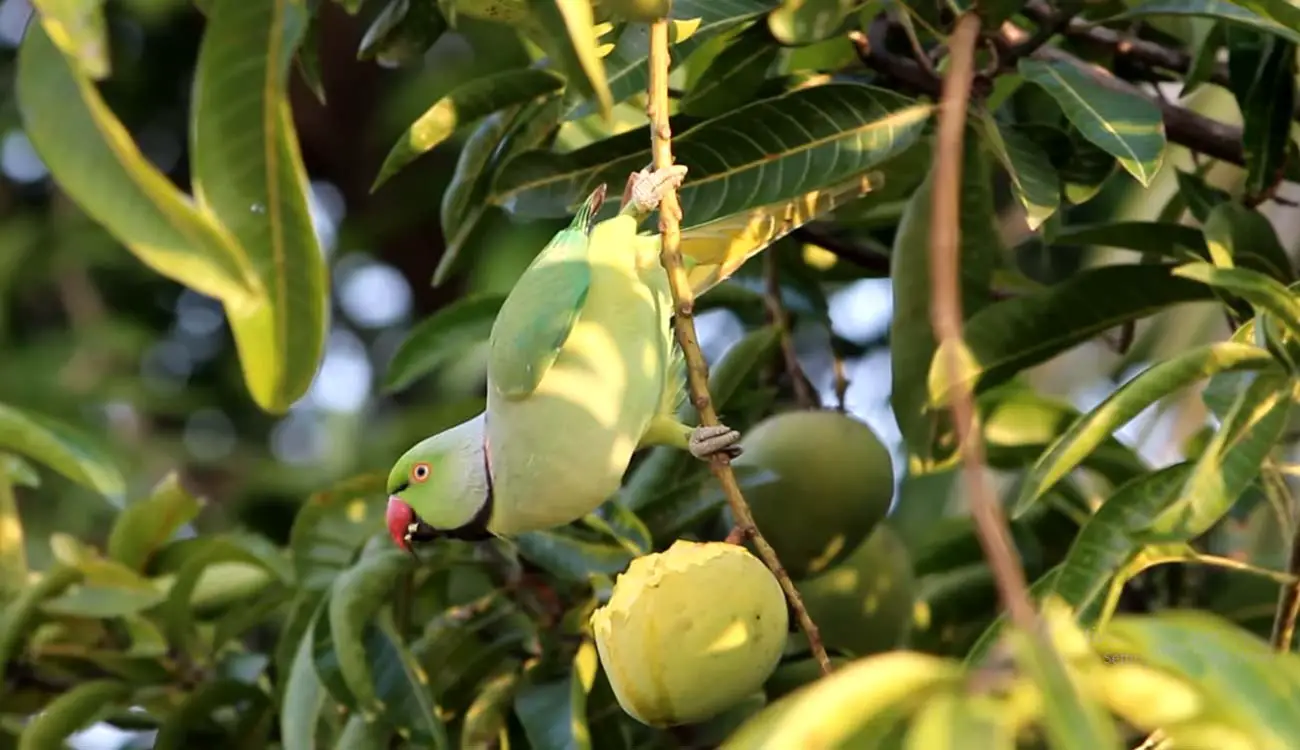Can Parrots Eat Mangoes?
Mangoes, those sweet and juicy tropical delights, often find their way into our diets, and it’s only natural to wonder if they can be a part of our feathered friends’ meals too. Parrots, known for their vibrant plumage and charming personalities, have unique dietary needs that require careful consideration.
Mangoes are renowned for their rich nutritional profile, containing a wealth of vitamins, such as A, C, and E, along with essential minerals like potassium. Moreover, these fruits are packed with dietary fiber and antioxidants that promote overall well-being.
But, as with any food, it’s crucial to approach mangoes cautiously when it comes to parrots. While mangoes offer numerous health benefits, there are concerns to address. Parrot owners must strike a balance between introducing new and exciting foods into their pets’ diets and ensuring their feathered companions’ safety.
In this article, we’ll delve into the nutritional value of mangoes for parrots, examining the potential advantages of incorporating this tropical fruit into their meals. We’ll also discuss safety considerations, preparation methods, serving guidelines, and how to monitor for any adverse reactions.
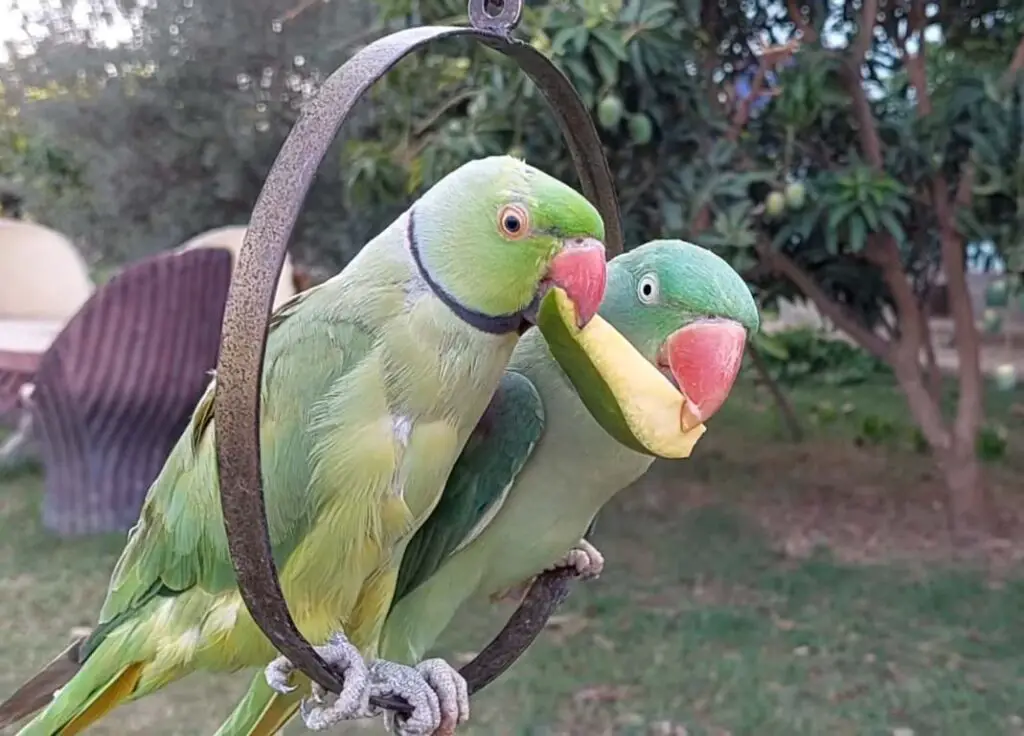
Mango Nutrients for Parrots
Mangoes are a tropical delight not only for humans but also for our feathered friends. These vibrant fruits offer a treasure trove of vitamins and antioxidants that can have positive effects on your parrot’s health. Here’s a closer look at the nutritional benefits:

1. Vitamins
Mangoes are rich in essential vitamins that can boost your parrot’s immune system and overall well-being. They contain significant amounts of vitamin A, which is crucial for maintaining healthy feathers, skin, and eyes.
Vitamin C, another vital nutrient present in mangoes, plays a role in strengthening the immune system and aiding in the absorption of other nutrients.
Vitamin E, found in mangoes, is known for its antioxidant properties, which can help protect cells from damage caused by free radicals.
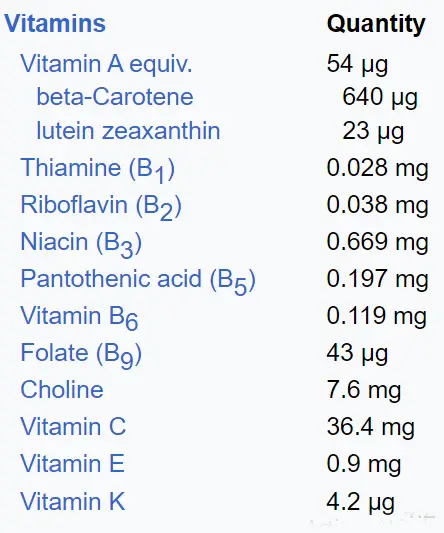
2. Antioxidants
Mangoes are packed with antioxidants, including beta-carotene and quercetin. These compounds can help combat oxidative stress and reduce the risk of cellular damage.
Antioxidants play a crucial role in maintaining your parrot’s overall health and may contribute to a longer, happier life.
3. Dietary Fiber
Mangoes also provide dietary fiber, which can aid in digestion and promote a healthy gut. This can be especially beneficial for parrots, as digestive health is essential for nutrient absorption.
Related article–Can Parrots Have Rambutan?
4. Minarals
Mangoes are a good source of a variety of minerals, including:
- Potassium: Potassium is an electrolyte that helps regulate blood pressure and fluid balance. It is also important for muscle function and nerve signaling.
- Calcium: Calcium is essential for strong bones and teeth. It is also involved in muscle contraction and nerve function.
- Magnesium: Magnesium is important for energy production, muscle function, and nerve function. It also helps regulate blood sugar levels.
- Phosphorus: Phosphorus is essential for strong bones and teeth. It is also involved in energy production and cell function.
- Zinc: Zinc is important for immune function, wound healing, and cell growth.
- Copper: Copper is important for iron absorption, immune function, and cell growth.
- Manganese: Manganese is important for bone health, energy production, and cell function.
- Selenium: Selenium is an antioxidant that helps protect cells from damage.
The mineral content of mangoes can vary depending on the variety of mango and the ripeness of the fruit. However, a 1/2 cup serving of ripe mango provides the following amounts of minerals:
- Potassium: 200 milligrams
- Calcium: 20 milligrams
- Magnesium: 12 milligrams
- Phosphorus: 17 milligrams
- Zinc: 0.11 milligrams
- Copper: 0.137 milligrams
- Manganese: 0.08 milligrams
- Selenium: 0.09 micrograms
These minerals are important for overall health and well-being. They can help to support a strong immune system, healthy bones and teeth, and proper muscle and nerve function.
It is important to note that mangoes are also high in sugar. Therefore, it is important to feed mangoes to parrots in moderation. A good rule of thumb is to feed your parrot no more than 1/4 cup of mango per day.
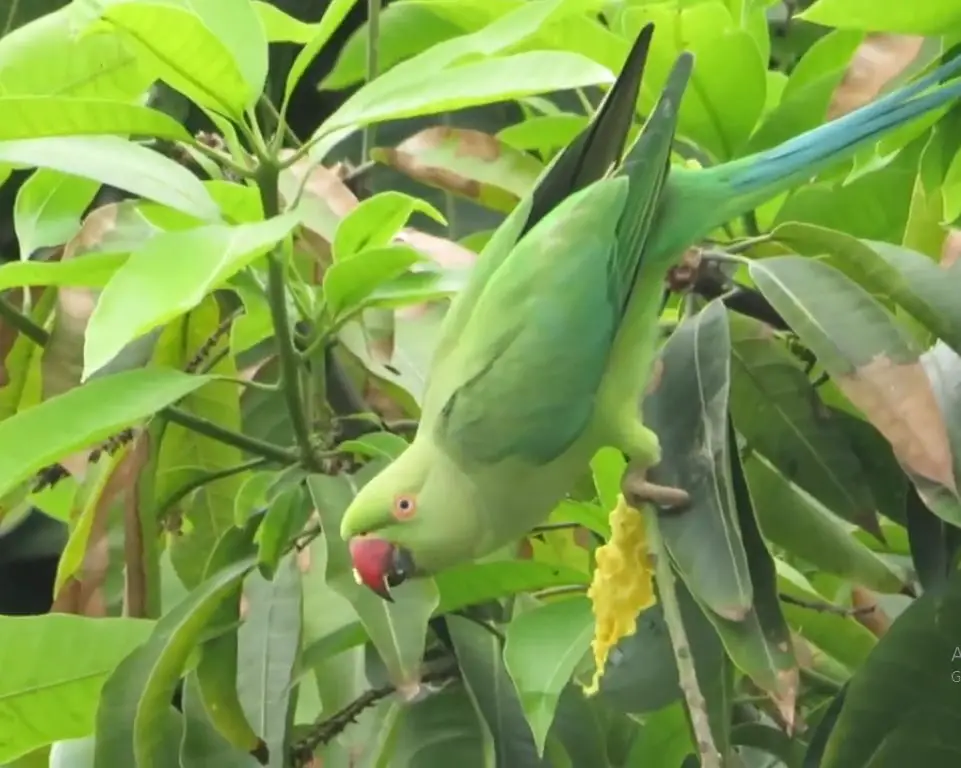
Can Parrots Eat Mangoes?
Yes, parrots can eat mangoes. Mangoes are a safe and non-toxic fruit for parrots. However, it’s important to offer mangoes in moderation due to their natural sugar content. Mangoes contain essential vitamins, fiber, and minerals that can be beneficial for a parrot’s overall health.
The key is to provide mangoes as a treat rather than a staple in the parrot’s diet. Excessive consumption of mangoes, like any other fruit high in sugar, can lead to an imbalance in the parrot’s diet and potentially cause health issues such as obesity or digestive problems.
Related reading- Can Parrots eat Lychee?
Safety Concerns When Feeding Mangoes to Parrots
While mangoes offer several health benefits for parrots, it’s essential to be aware of potential safety concerns to ensure your feathered friend’s well-being:
1. Moderation is Key: Mangoes are a treat, and like all treats, they should be offered in moderation. Excessive consumption can lead to weight gain and disrupt the balance of nutrients in a parrot’s diet.
2. Allergic Reactions: Just like humans, parrots can have allergies too. Some parrots may be sensitive to certain foods, including mangoes. When introducing mangoes into your parrot’s diet for the first time, keep a close eye for any signs of allergies, such as itching, rashes, or digestive discomfort.
3. Digestive Sensitivity: Mangoes contain natural sugars and dietary fiber, which can be challenging for some parrots to digest. Feeding too much mango at once may lead to digestive issues, including diarrhea. To avoid this, start with small amounts and monitor your parrot’s response.
4. Pesticides and Chemicals: Ensure that the mangoes you offer to your parrot are free from pesticides and chemicals. These substances can be harmful to parrots, so it’s wise to opt for organic or thoroughly washed mangoes.
5. Pit and Skin: The mango pit and skin are not safe for parrots to consume. They can be a choking hazard and may contain compounds that are toxic to birds. Always remove the pit and peel the mango before offering it to your parrot.
6. Variety is Key: While mangoes can be a delightful addition to your parrot’s diet, it’s crucial to remember that a balanced diet for parrots should consist of a variety of fruits, vegetables, seeds, and pellets. Mangoes should be part of this diverse diet rather than the sole focus.
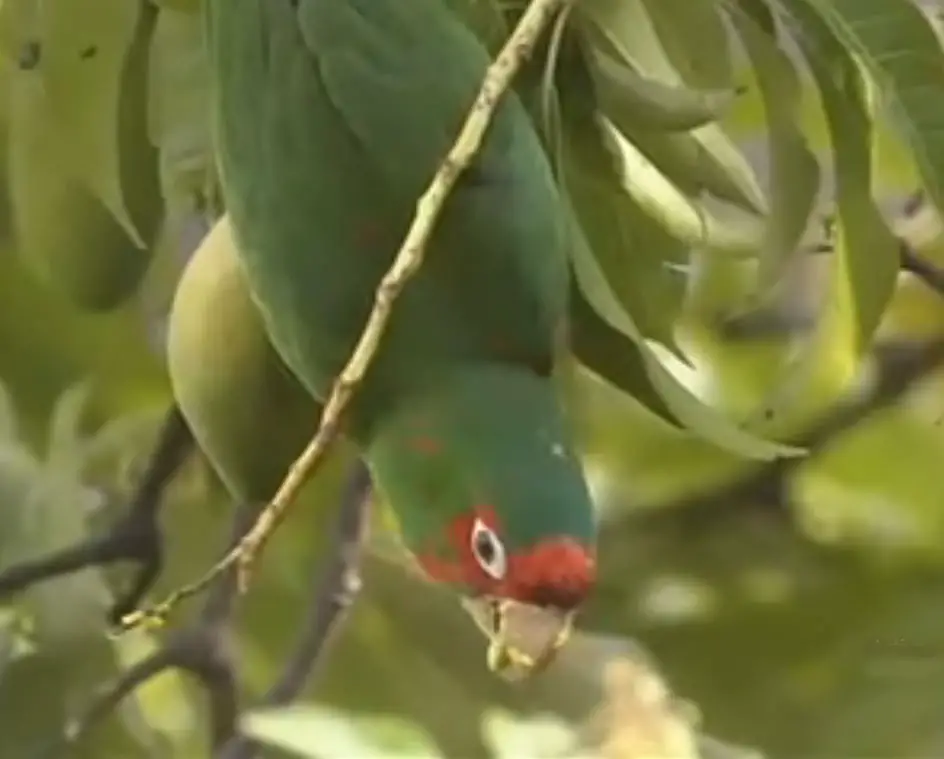
Preparing Mangoes for Parrots
Properly preparing mangoes for your parrot is essential to ensure their safety and enjoyment. Here are steps to follow:
Selection
Choose ripe but not overly ripe mangoes. They should yield slightly to gentle pressure when squeezed.
Washing
Thoroughly wash the mango under running water to remove any dirt, chemicals, or pesticides. This step is crucial, especially if you’re not using organic mangoes.
Peeling
Peel the mango to remove the skin. Parrots may have difficulty digesting mango skin, and it can be a choking hazard.
Removing the Pit
Carefully cut around the mango’s pit. The pit is not safe for parrots and can also be a choking risk. Ensure there are no remnants of the pit left in the fruit.
Slicing into Parrot-Sized Pieces
Cut the mango into small, bite-sized pieces suitable for your parrot to handle. These pieces should be easy for your parrot to pick up and eat comfortably.
Freshness
Serve the prepared mango to your parrot immediately. Fresh fruit is more appealing and nutritious.
Freezing and Thawing
If you have excess mango, you can freeze it for later use. Ensure it’s cut into small pieces and placed in an airtight container. Thaw and bring it to room temperature before offering it to your parrot.
Variety in Presentation
To keep your parrot engaged, consider offering mango in different ways. You can hang small mango chunks in their cage, mix them with other fruits, or offer them as a handheld treat during bonding time.
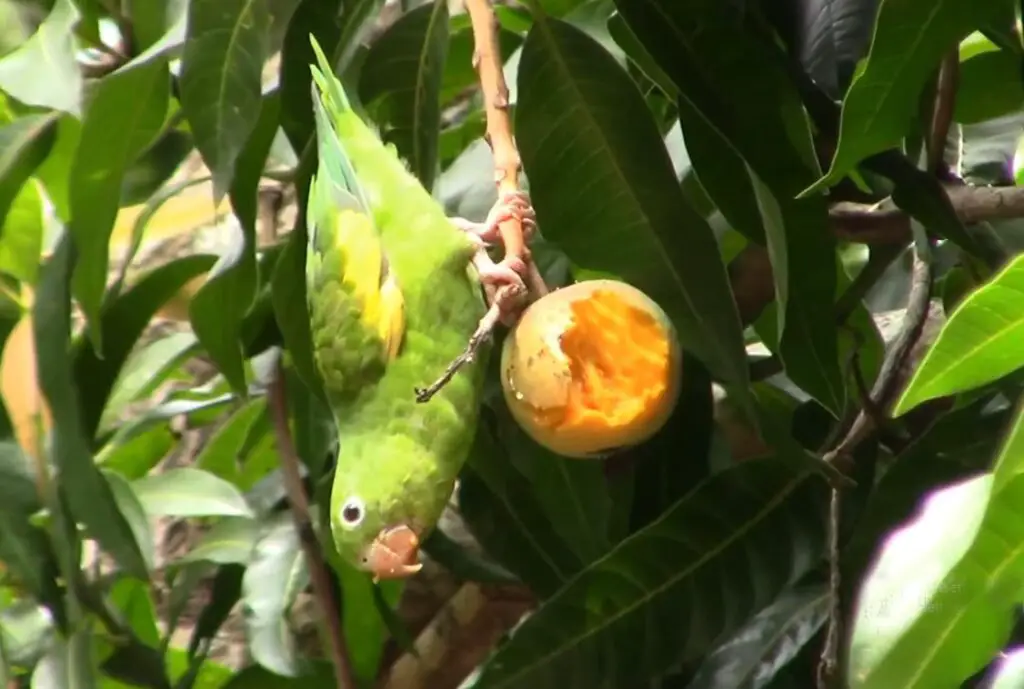
Serving Mango to Your Parrot
When it comes to serving mango to your parrot, it’s important to strike a balance between offering this tasty treat and maintaining a well-rounded diet. Here’s how to do it effectively:
Offer Small Amounts Occasionally
Mango should be considered a special treat rather than a daily staple in your parrot’s diet. Parrots have specific nutritional requirements, and overindulging in mangoes can upset the balance of their diet.
Portion Size
The portion size of mango should be small and appropriate for your parrot’s size and dietary needs. Consider a few bite-sized pieces at a time.
Frequency
Limit mango consumption to once or twice a week. This infrequent offering keeps the treat aspect intact and prevents overconsumption.
Balance with Other Fruits and Veggies
Mango should complement a diverse diet that includes a variety of fruits, vegetables, seeds, and pellets. This variety ensures your parrot receives all the essential nutrients for optimal health.
Nutritional Balance
Pair mango with other fruits and vegetables to create a balanced meal. For example, you can serve mango alongside leafy greens, bell peppers, or other parrot-safe fruits like apples, berries, or oranges.
Monitor Consumption
Pay attention to how your parrot reacts to mango. Some parrots may love it, while others may be less interested. Adjust the frequency and portion size based on your parrot’s preferences and any signs of digestive issues.
Avoid Overloading on Sugars
Mangoes contain natural sugars, so be mindful not to offer too many sugary treats in one day. A balanced diet is essential to prevent obesity and related health problems.
By offering mango in moderation and in combination with other nutritious foods, you can provide your parrot with a delicious and balanced diet. Remember that the key to parrot health is variety, moderation, and careful observation of your feathered friend’s dietary preferences and needs.
Related Article- Can Parrots Eat Apples? Nutritional Values, Toxicity, and Health Benefits
Alternative Fruits to Mango
Parrots are known for their love of fruits, and mangoes are often a hit. However, it’s important to provide a diverse array of fruits to ensure a balanced diet and to keep your feathered friend engaged. Here are some other fruits that can be delightful additions to your parrot’s diet:
- Apples: Apples are a great choice for parrots due to their mild sweetness and crisp texture. They provide essential vitamins like A and C, as well as dietary fiber. Be sure to remove seeds and the core, as the seeds contain trace amounts of cyanide.
- Bananas: Bananas are a parrot favorite because of their creamy texture and sweet taste. They are rich in potassium, vitamin C, and vitamin B6, promoting overall health.
- Berries (e.g., blueberries, strawberries, raspberries): Berries are packed with antioxidants and vitamins, making them a nutritious option for parrots. Blueberries, strawberries, and raspberries can be provided in small quantities and are rich in vitamins C, K, and various minerals.
- Papayas: Papayas are a tropical fruit that many parrots enjoy. They’re soft and easy to eat, providing vitamins A, C, and E. Papayas also contain digestive enzymes that can aid in digestion for parrots.
- Pineapples: Pineapples offer a tangy and sweet flavor that some parrots find appealing. They are a good source of vitamin C and manganese. However, feed them in moderation due to their acidic nature.
- Grapes: Seedless grapes are a convenient and tasty treat for parrots. They are hydrating and contain natural sugars along with vitamins and minerals. Cut them into smaller pieces for easier consumption.
- Oranges: Oranges are rich in vitamin C and can be offered occasionally in small portions. Remove any seeds and limit the amount due to their high sugar content and acidity.
- Pears: Pears are gentle on a parrot’s digestive system and provide dietary fiber, vitamins, and minerals. Make sure to remove seeds and stems before offering.
- Kiwi: Kiwi is a nutrient-dense fruit, containing vitamins C, K, and E, as well as dietary fiber. It has a unique flavor that some parrots may enjoy. Remove the skin and cut into manageable pieces.
- Cherries: Pitless cherries can be given as a treat. They contain vitamins A and C, along with antioxidants. Offer them in moderation due to their sugar content.
Final Thought
The question of whether parrots can eat mangoes can be answered with a resounding “yes,” but it comes with some important caveats. Mangoes are not only a delicious treat but also offer valuable nutritional benefits to your feathered friend, including essential vitamins and antioxidants. However, to ensure the health and happiness of your parrot, it’s crucial to exercise caution and responsible feeding practices.
